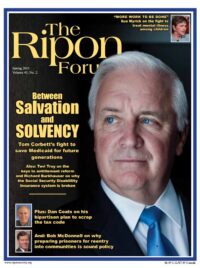
For the past 50 years, the American public has placed a high value on transparency in its government. Open meeting laws are pervasive and popular in government. Transparency is rightly thought to be an integral part of our democratic process.
But all good things can be overdone. There are exceptions to nearly every good rule. While acknowledging that openness is a virtue, it is not a bad idea to recall that our own prized Constitution was put together under conditions of strictest secrecy.
The Framers operated behind locked doors and windows, with the press barred from entry to Independence Hall, and the Delegates sworn to secrecy. In so doing, they set a standard that their successors sometimes forget. They achieved their grand compromise in a series of closed meetings, secure in the knowledge that their work would be voted on publicly by all Delegates. They knew, too, that it would later have to pass — or fail — in the sunshine of state ratification conventions.
Nowadays, the Congress acts in a similar manner. Groups of members, sometimes full committees, hold non-public meetings to find agreement on thorny problems. But, committees and both the full House and Senate invariably subject bills and resolutions to public debate and open voting.
The Framers operated behind locked doors and windows, with the press barred from entry to Independence Hall, and the Delegates sworn to secrecy. In so doing, they set a standard that their successors sometimes forget.
When the President negotiated with the Speaker and the Senate Majority Leader on the FY 2011 Appropriations package, the meetings were secret until the compromise was announced. Nearly all union/management bargaining is done in secret. In our system, difficult compromises are not achieved in full sunlight.
Whether for public or private purposes, the reasons for such closed meetings are simple: the negotiators expect to be judged by the total product, not by the day-by-day or point-by-point discussions.
In contentious issues — like the creation of the Constitution, a compromise on the budget, or comprehensive tax reform — strong positions must be abandoned for the success of the final, comprehensive solution. If early concessions are revealed, the process may be doomed.
As American politics have become more polarized, political activists at both ends of the spectrum have become less trusting of their representatives. The zealots of the polar constituencies — who might tolerate a final compromise which were to include concessions by their opponents — are highly intolerant of their own representatives “caving in” on any of their strongly-held positions as the negotiations proceed.
As noted, Congress has found a way “around” its open meeting rules. But statutory and presidential commissions, which are assigned the most divisive questions, cannot avoid the strictures of the open meeting law. In 1988, for example, The National Economic Commission was obliged to terminate its work after a successful lawsuit forced it to open up its discussions. Its members, including Reagan Administration appointees, union leaders, and congressmen, were unwilling to negotiate under the harsh glare of TV cameras.
In our current debt and deficit crisis, more and more commissions will likely be created to resolve the most difficult political questions. The most obvious recent example is the Fiscal Commission headed by former White House Chief of Staff Erskine Bowles and former Wyoming Senator Alan Simpson. The open meeting law was not this group’s primary difficulty. But the law certainly made its work more difficult. The leaders were obliged to hold repeated, separate meetings with individual members, rather than being able to discuss the problems with everybody present. Without extraordinary effort on the part of its leaders, the Commission might never been able to report a majority vote of 11 of 18.
This Bowles-Simpson Fiscal Commission will be followed by other commissions. The debt and deficit crisis will require a decade of hard work just to stabilize the debt. One can imagine a series of commissions, some structured in the manner of a base closing commission with the right to bring its solutions directly to the floor of both houses.
The point is this – if we are going to rely on commissions to help us meet our most pressing fiscal challenges, we need to make sure they have the space and breathing room that will help them get the job done.
President Bush’s Social Security Commission and his Tax Reform Commission were both hampered by the open meeting law. And yet looking ahead, we will probably need to establish future similar commission to deal with each of these political explosive issues. Perhaps there will also be a Targets and Triggers Commission, a Medicare Commission, a Safety Net Commission, and more.
The point is this – if we are going to rely on commissions to help us meet our most pressing fiscal challenges, we need to make sure they have the space and breathing room that will help them get the job done. To that end, future commissions of this nature should be granted some kind of waiver to give them a way around the open meeting law so that they can operate and deliberate in the same way the Framers did when they drafted the Constitution – in private. Otherwise, these commissions may be created in vain, like most of their predecessors.
Transparency and openness are wonderful for debates and for actual voting. However, history shows that they have been a real hindrance to successful bargaining and negotiating of tough issues, especially in today’s polarized political environment.
Bill Frenzel, a former Member of Congress (MN-3), has served on three presidential commissions. He currently serves as the Chairman Emeritus of The Ripon Society and Chairman of The Ripon Forum’s editorial board, among his many other roles.




